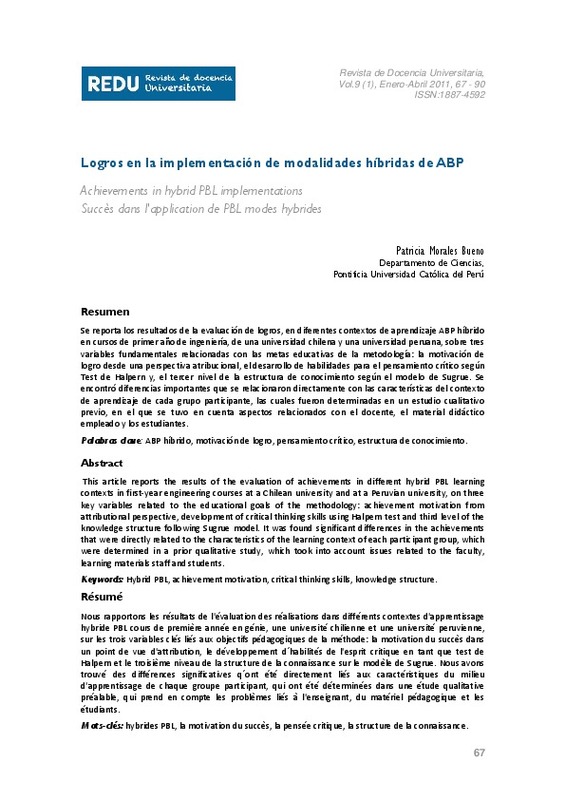Camp, G. (1996). Problem-based learning: a paradigm shift or a passing fad? Medical Education Online, 1(2), 1-6.
Dochy, F.; Segers, M.; Van Den Bossche, P. Y Gijbels, D. (2003). Effects of problembased learning: a meta-analysis. Learning and Instruction, 13, 533-568.
Gijbels, D.; Dochy, F.; Van Den Bossche, P. Y Segers, M. (2005). Effects of problembased learning: a meta-analysis from the angle of assessment. Review of Educational Research, 75(1), 27-61.
[+]
Camp, G. (1996). Problem-based learning: a paradigm shift or a passing fad? Medical Education Online, 1(2), 1-6.
Dochy, F.; Segers, M.; Van Den Bossche, P. Y Gijbels, D. (2003). Effects of problembased learning: a meta-analysis. Learning and Instruction, 13, 533-568.
Gijbels, D.; Dochy, F.; Van Den Bossche, P. Y Segers, M. (2005). Effects of problembased learning: a meta-analysis from the angle of assessment. Review of Educational Research, 75(1), 27-61.
Halpern, D. (1989). Thought and knowledge. An introduction to critical thinking, 2nd ed. New Jersey: Lawrence Erlbaum Associates, Publishers.
Halpern, D. (1998). Teaching critical thinking for transfer across domains. Dispositions, skills, structure training, and metacognitive monitoring. American Psychologist, 53(4), 449-455.
Halpern, D. (2005). Halpern critical thinking assessment: background and scoring standards. Manuscrito no publicado.
Morales, P. Y Gómez, V. (2009). Adaptación de la escala atribucional de motivación de logro de Manassero y Vázquez: incorporación de dimensiones relacionadas al aprendizaje colaborativo. Manuscrito presentado para su publicación.
Neville, A. (1999). The problem-based learning tutor: teacher? facilitator? evaluator? Medical Teacher, 21(4), 393-401.
Newman, M. (2003). A pilot systematic review and meta-analysis on the effectiveness of problem based learning. The Campbell Collaboration Systematic Review Group. Recuperado el 31 de marzo del 2006, de: www.hebes.mdx.ac.uk/teaching/Research/PEPBL/PSR-PBL.pdf.
Piñuel, J. L. (2002). Epistemología, metodología y técnicas del análisis de contenido. Estudios de Sociolingüística, 3 (1), 1-42.
Saiz, C. (2006). Evaluación del pensamiento crítico de Halpern (HCTAES). URL: http://web.usal.es/~csaiz/pensacono/recursos.htm.
Sugrue, B. (1994). Specifications for the design of problem-solving assessments in science: project 2.1 designs for assessing individual and group problem-solving (CSE Tech. Rep. N° 387). Los Angeles: National Center for Research on Evaluation, Standards, and Student Testing.
Sugrue, B. (1995). A theory-based framework for assessing domain-specific problem solving ability. Educational Measurement: Issues and Practice, 14(3), 29-36.
Valenzuela, J. (2006). Enseñanza de habilidades de pensamiento y motivación escolar. Efectos del modelo integrado para el aprendizaje profundo (MIAP) sobre la motivación de logro, el sentido del aprendizaje escolar y la autoeficacia. Tesis de Doctorado en Ciencias de la Educación. Facultad de Educación. Pontificia Universidad Católica de Chile
Weiner, B. (1986 A). An attributional theory of motivation and emotion. New York: Springer-Verlag.
Weiner, B. (1986 B). Attribution, emotion and action. En R. M. Sorrentino y E. T. Higgins (Eds.), Handbook of motivation and cognition, foundations of social behavior (pp. 281-312). NY: Guilford Press.
[-]








